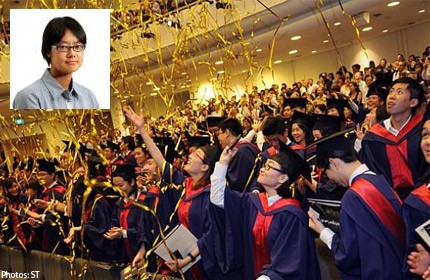Why do mega donations tend to go to universities?

If you had millions of dollars to donate, where would it go?
One popular answer seems to be: Universities.
This week, the National University of Singapore and Singapore University of Technology and Design announced that they have raised more than $200 million in donations from over 30 donors.
Granted, this fund-raising drive is a special one, to commemorate founding Prime Minister Lee Kuan Yew’s 90th birthday; and the $200 million will be used for years to come, with part of it going towards setting up funds for needy students.
But the sum is still an eyebrow-raising one. What it also raises is the question: how is it that universities can raise funds which other causes might only be able to dream of?
This year, for instance, the Community Chest needs only $85.9 million to fund 228 social service programmes, which will help over 300,000 people.
How much it will raise this year is not yet known, but last year it collected $66.2 million.
Of course, donating to a university does not preclude donating to other causes. And the debate over the ‘proper’ recipients of charity is one with no end in sight. One perennial question is how one can justify donating to animal charities rather than those which help humans.
So this is not a call for philanthropists to stop giving to universities. A donation to a worthy cause is still a worthy one, even if competing causes are passed over.
Rather, the argument here is that the reasons for donating to universities should also spur one to give to less glamorous causes.
Let’s leave aside the cynical possibility that some donors get a thrill from seeing a school, building or scholarship bearing their name.
The most obvious reasons for donating to a university are to support the great cause of Education, and the related but distinct cause of Academia.
And indeed, part of the $200 million raised by both universities will towards scholarships, study awards and bursaries, while some of the rest goes to academic programmes, including the establishment of a professorship in the Lee Kuan Yew School of Public Policy.
Alumni ties might be one reason some donate.
But there might also be the sense that in giving to universities, one is making an investment in the country’s future, in its best and brightest – a compelling notion.
Even the narrative of meritocracy plays a part. As Prime Minister Lee Hsien Loong put it at the donor appreciation dinner on Tuesday: “Those who have benefited from this system have an obligation, a responsibility to contribute back to society and help others to do well.”
It is easy to parse ‘helping others do well’ in the sense of helping the needy achieve excellence and success, the same way one might have done in life, if one is now a rich philanthropist. And what better route than education?
Donations to universities fit into a vision of progress and a brighter future in a way that donations to a cancer charity, say, or a hospice may not.
Rather than arguing against this motivation in favour of others – alleviating suffering, say – one can argue that that same motivation should also prompt donations to other causes.
If one wishes to support education, one should support it at all levels.
Helping needy students afford a university education is important. But there are many earlier obstacles on the way to university which could have cut short the journey of equally bright and deserving students.
In short, if equality of educational opportunity is the goal, then the help must begin early.
This is not just help via the usual routes such as bursaries and scholarships. It means making sure that, yes, every school is a good school – particularly those schools which may not benefit from the largesse of prominent alumni.
It means more support for needy single parents or low-income households, because a child’s ability to excel in school is affected by their home situation, too.
What about academia?
Some would say that academia should be above utilitarian considerations such as ‘goals’ and ‘aims’ – witness, for instance, the anxiety in Britain and the US when humanities budgets are cut.
The quest for knowledge and understanding could thus be seen as something worth supporting for its own sake.
But what is knowledge for, if not the improvement of humanity in one way or another? Humanities departments claim an ennobling role for their discipline; in the sciences and social sciences, academic progress is a way to technological or societal progress.
And if we care about improving humanity in this abstract way, should we not also care about directly improving the lives of actual people?
The 30 or so donors to NUS and SUTD should not be faulted for their generosity. But the $200 million sum they have contributed should remind us of the many other causes which we have reason to support.
janiceh@sph.com.sg

Go to Singapolitics for more stories.